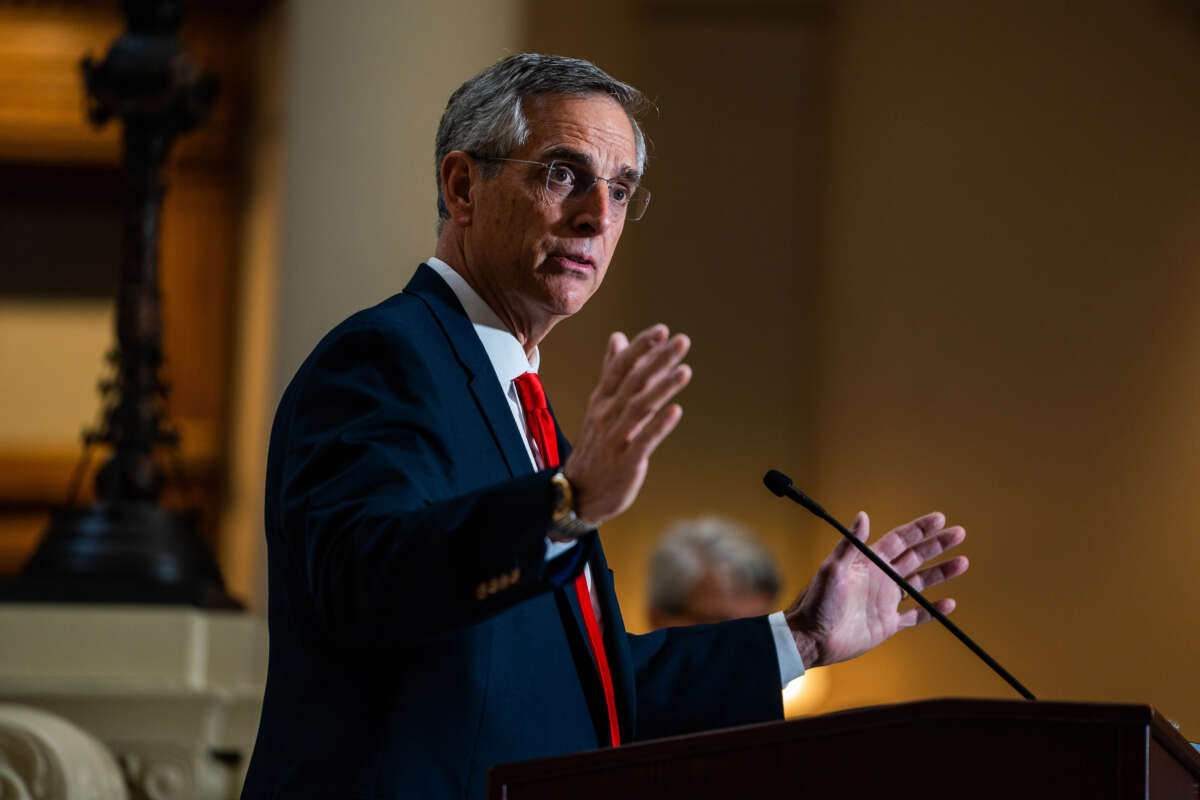Did you know that Truthout is a nonprofit and independently funded by readers like you? If you value what we do, please support our work with a donation.
Georgia Secretary of State Brad Raffensperger (R) called for an end to two-round runoff elections in the state on Wednesday, saying that the system in its current form is burdensome for voters.
Georgia law requires candidates in state-run elections to achieve a majority vote in order to win office. If no candidate can do so, the two candidates with the highest vote totals move on to a runoff round that takes place four weeks after the original Election Day.
The state has had three high profile runoff elections in the past two years, two senatorial races in the 2020 campaign season and one senatorial race in this year’s midterms — all of which were significant in determining political outcomes in Washington D.C.
“Georgia is one of the only states in the country with a General Election Runoff. We’re also one of the only states that always seems to have a runoff,” Raffensperger said on Wednesday.
The runoffs cause the campaigns to extend into the holiday season, particularly Thanksgiving — something that can be annoying to residents of the state. “No one wants to be dealing with politics in the middle of their family holiday,” said Raffensperger, who is the highest ranking elections official in Georgia.
Raffensperger also noted in his statement that elections were tough “on the counties who had a difficult time completing all of their deadlines, an election audit and executing a runoff in a four-week time period.”
“I’m calling on the [state] General Assembly to visit the topic of the General Election Runoff and consider reforms,” he added.
Raffensperger did not indicate the reforms he had in mind, but a spokesperson for him suggested three alternatives, according to reporting from NBC News. The runoff could be replaced, for example, by an instant runoff system, wherein voters rank all the candidates on a ballot for a particular race. If no candidate receives a majority vote in the first round, the candidate with the least amount of votes is removed from the count and their votes go to voters’ second choice, with the process repeating until someone receives a majority.
The spokesperson for Raffensperger also suggested that the state could lower the threshold a candidate needs to win office — instead of requiring a majority, the state could require a high plurality of votes, as it did briefly in the 1990s through the early 2000s. Another option could be eliminating third-party candidates from automatic ballot access, the spokesperson suggested.
The runoff system as it currently works in Georgia dilutes the voting power of residents from marginalized communities by requiring them to come to the polls twice in order to support their preferred candidate. Indeed, when the runoff system was originally introduced, it was done so with the specific purpose of diluting the power of Black voters in the state.
Some voting rights advocates have questioned Raffensperger’s intentions, as his comments come weeks after Republican senatorial candidate Herschel Walker lost to Democratic incumbent Senator Raphael Warnock.
“Raffensperger was fine with run-offs when the GOP used them as a racist tool to disenfranchise Black voters. He supported shortening the time period 2021 — when it looked like it would help the GOP win. Now that Warnock won, he wants them ended,” tweeted Marc Elias, founder of the voting rights group Democracy Docket.
Still, some election officials agreed that the process of holding two elections so close together is burdensome for voters.
“A four week turnaround from a general election to a general runoff is an almost impossible task,” said Cobb County Elections Supervisor Janine Eveler.
Press freedom is under attack
As Trump cracks down on political speech, independent media is increasingly necessary.
Truthout produces reporting you won’t see in the mainstream: journalism from the frontlines of global conflict, interviews with grassroots movement leaders, high-quality legal analysis and more.
Our work is possible thanks to reader support. Help Truthout catalyze change and social justice — make a tax-deductible monthly or one-time donation today.
